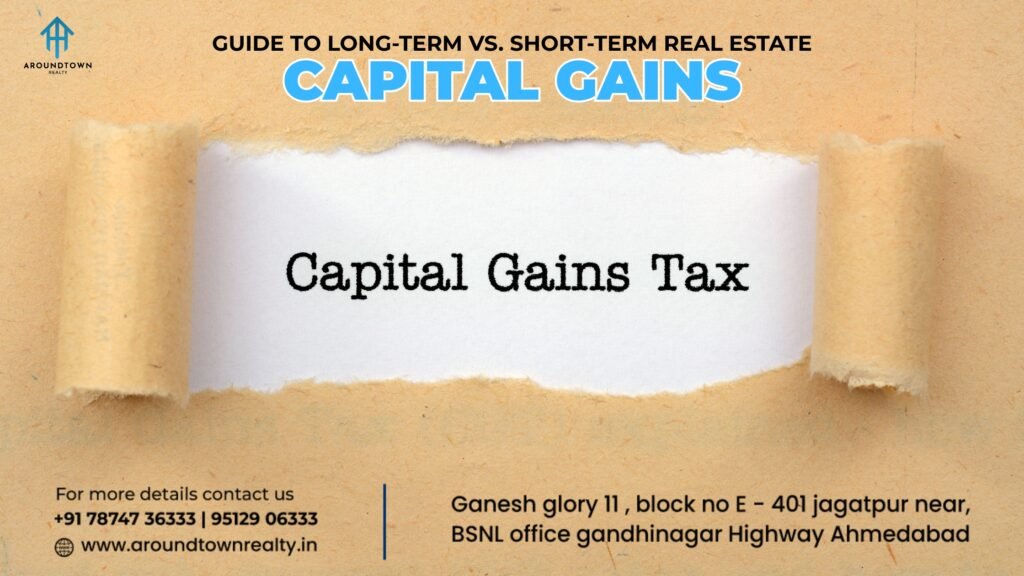Understanding how capital gains are taxed is critical when buying or selling property in India. Whether you’re a first-time homebuyer, a seasoned investor, or someone planning to sell inherited property, the difference between long-term or short-term capital gains can significantly affect how much tax you pay—and how much you keep in your pocket.
In this comprehensive guide, we’ll break down everything you need to know about Long-Term or Short-Term Real Estate Capital Gains, from definitions and calculations to exemptions and smart tax-saving strategies.
What Are Capital Gains in Real Estate?
Capital gains refer to the profit earned from the sale of a capital asset, such as real estate. When the selling price of a property exceeds its purchase price, the difference is classified as a capital gain and is taxable under the Income Tax Act of India.
But not all capital gains are treated equally. The tax implications differ significantly depending on how long you’ve held the property before selling it.
Short-Term vs. Long-Term: What’s the Difference?
Short-Term Capital Gains (STCG)
- Holding Period: Less than 24 months for real estate (as of the current tax rules in India).
- Tax Rate: Taxed as per the individual’s income tax slab.
- Indexation Benefit: Not available.
- Deductions: Limited.
Selling property within two years of purchase? The profit is considered a short-term capital gain and will be added to your annual income, taxed as per your applicable slab rate—whether 5%, 20%, or 30%.
Example:
You bought a flat in 2023 for ₹60 lakhs and sold it in 2024 for ₹80 lakhs. The ₹20 lakhs gain is added to your income for that year. If you fall under the 30% slab, you could pay ₹6 lakhs or more as tax on that gain alone.
Long-Term Capital Gains (LTCG)
- Holding Period: More than 24 months.
- Tax Rate: Flat 20% with indexation benefit.
- Indexation Benefit: Available.
- Deductions: You can claim exemptions under Sections 54, 54EC, 54F, etc.
If you hold the property for more than two years before selling it, your profit is taxed at a concessional 20% rate after adjusting for inflation using Cost Inflation Index (CII). This drastically reduces the taxable amount.
Example:
Bought in 2015 for ₹50 lakhs, sold in 2025 for ₹1.2 crore.
Indexed cost of acquisition might become ₹85 lakhs (approx), so LTCG = ₹35 lakhs.
Tax @20% = ₹7 lakhs (instead of ₹14 lakhs without indexation).
READ THIS FOR MORE, Capital Gains Tax on Property Sales Explained
Indexation: The Silent Tax Saver
Indexation allows you to adjust the purchase price of your property to account for inflation, thereby reducing the taxable gain. It’s applicable only to long-term gains.
Formula:
Indexed Cost of Acquisition = Purchase Price × (CII of Sale Year / CII of Purchase Year)
It ensures that you’re taxed only on real profits, not on inflationary gains.
Key Exemptions Available on LTCG
You can reduce or even eliminate your long-term capital gains tax by investing the profits in specific assets:
Section 54 – Reinvest in Another Residential Property
If you’re an individual or HUF and sell a residential property, reinvesting the gains in another residential property within 2 years (or 1 year before the sale) can exempt you from LTCG tax.
You can also construct a home within 3 years of selling the old one.
Section 54EC – Invest in Capital Gain Bonds
You can invest up to ₹50 lakhs in specified bonds (like NHAI or REC) within 6 months of the sale. These bonds lock your funds for 5 years but offer full exemption on the amount invested.
Section 54F – Sell Any Asset and Buy a Home
If you sell any capital asset (not necessarily a home) and use the entire net consideration to buy a residential house, you can claim exemption under this section. However, you must not own more than one other residential property.
Tax Implications for NRIs
For Non-Resident Indians (NRIs):
- STCG is taxed at slab rates (plus surcharge and cess).
- LTCG is taxed at 20% with indexation.
- TDS (Tax Deducted at Source) is deducted at source—20% for LTCG and 30% for STCG.
- NRIs can also claim exemptions under 54/54EC/54F but may need to file for a refund if TDS is higher.
Common Mistakes to Avoid
- Selling too early: Selling before 24 months might increase your tax burden significantly.
- Ignoring indexation: Not using CII for LTCG can result in overpayment.
- Missing deadlines: You must invest gains in new assets or bonds within the stipulated time to claim exemptions.
- Not filing ITR properly: Failing to disclose gains or exemption claims in your return could invite scrutiny.
- Assuming inherited property has no tax: Even if you inherit property, capital gains tax applies when you sell it, based on the original owner’s purchase date and cost.
Which One is Better for You?
| Criteria | Short-Term Holding (< 2 years) | Long-Term Holding (> 2 years) |
| Tax Rate | Slab-based (up to 30%) | Flat 20% |
| Indexation | Not Available | Available |
| Exemptions | Few | Many (Sections 54, 54F, 54EC) |
| Best For | Quick profit flips | Stable, tax-efficient investment |
Conclusion: Time Your Sale Strategically
Understanding the tax implications of short-term vs. long-term capital gains is essential for strategic real estate investing. By simply holding on to your property a little longer or planning your reinvestment smartly, you can significantly reduce or eliminate tax liabilities.
For property investors in Gujarat, especially in high-demand markets like Ahmedabad, Gandhinagar, or Surat—timing, documentation, and expert guidance make all the difference. If you’re unsure when or how to sell your property, Around Town Realty (ATR) offers tailored advisory, resale guidance, and tax-optimized investment planning to ensure every move you make is financially sound.
Talk to ATR today and maximize your real estate gains with clarity and confidence.
FAQs
- Can I avoid capital gains tax completely?
Yes, if you reinvest the gains in another residential property (Section 54) or bonds (Section 54EC) within the timeline, you can claim full exemption. - What happens if I sell a gifted or inherited property?
You still pay capital gains tax when selling, but the holding period and purchase price of the original owner are considered for tax purposes. - Is indexation allowed for short-term gains?
No, indexation is available only for long-term capital gains. - What if I book a flat under construction with the gains?
You must complete the construction within 3 years of the sale to be eligible for exemption under Section 54. - Are commercial properties eligible for exemptions?
Section 54 applies only to residential properties. Section 54F may apply if selling commercial assets and reinvesting in a residential home.









